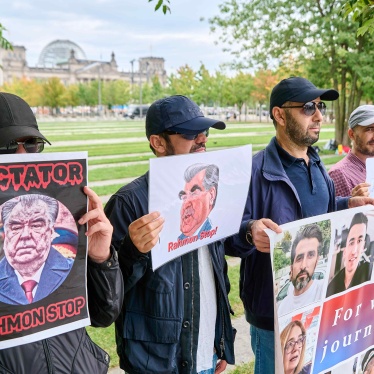December 8, 2016
His Excellency Shavkat Mirziyoyev
President-Elect
Republic of Uzbekistan
Your Excellency:
On the occasion of your election as President of Uzbekistan, we are writing to follow up on your campaign promises to deliver meaningful reform during your presidency, in particular regarding human rights in Uzbekistan, about which we have serious concerns. During your election campaign you made many promises to the Uzbek people including to increase the accountability of the government to its citizens, and we look forward to learning details of how you intend to fulfill those commitments.
While we acknowledge the many difficulties and challenges that lie ahead, we hope that you will use your good offices to ensure improvements in the following key areas in accordance with the international human rights norms that Uzbekistan has voluntarily ratified:
Free Political Prisoners: There are thousands of persons imprisoned on politically motivated charges in Uzbekistan’s jails, mostly religious believers, but also human rights and opposition activists, journalists, and other perceived critics. Many were arbitrarily arrested and detained, subjected to torture, prosecuted in unfair trials, and convicted on various “national security” crimes not recognized by international law and which violate Uzbekistan’s Constitution. They are in prison merely because they exercised their basic rights, including freedom of expression and association and peaceful assembly. Sentences range from 6 to 20 years and are often extended by a substantial number of years shortly before their terms are up. Among them are some of the world’s longest imprisoned journalists, including Muhammad Bekjanov and Yusuf Ruzimurodov, imprisoned in 1999 for 17 years, and human rights activists, including Akzam Turgunov, imprisoned in 2008 for 10 years.
During your campaign, you declared that the government would put into effect a prisoner amnesty in connection with Constitution Day this month. But as you know, prison authorities routinely do not apply the amnesty to persons convicted on politically motivated charges. Human Rights Watch urges you to prioritize the immediate and unconditional release of all persons imprisoned on politically motivated charges as a sign of your commitment to safeguarding one the most fundamental of rights—the right to peaceful dissent. The release of these prisoners should be accompanied by policy changes to allow them and other activists to continue their peaceful activities upon release, including protecting their right to membership in human rights groups, media organizations, and opposition political parties. In the meantime, Human Rights Watch believes it is imperative that you publicly signal an end to and zero tolerance for abuse, ill-treatment, torture, harassment, and systematic denial of access to necessary medical treatment that has been happening in many prisons and detention facilities throughout the country.
Cooperate with UN Rights Bodies: The Uzbek government’s record of cooperation with international institutions, particularly organs of the United Nations, remains poor. Uzbekistan has continuously denied access to UN thematic special procedures of the Human Rights Council since 2002, despite Uzbekistan’s formal standing invitation and longstanding and repeated requests for invitations to visit addressed by several rapporteurs. We urge you to reverse this trend, by issuing invitations to all UN human rights experts who have requested access, beginning with the Special Rapporteur on torture, and to use the president’s good offices to ensure cooperation with UN rights organs.
End Torture: As the UN Committee against Torture recognized in 2013, despite “numerous, ongoing and consistent allegations” of torture in Uzbekistan’s prisons and places of detention, the government has regularly denied its widespread and systematic nature in the country, and has failed to make meaningful progress on recommendations made by the UN Special Rapporteur on torture and other international bodies. Human Rights Watch’s research has shown that law enforcement officials routinely use torture—including beating with batons and plastic bottles filled with water, hanging by wrists and ankles, rape, and sexual humiliation—to coerce confessions.
As you recently acknowledged in public remarks, although the government introduced habeas corpus (judicial review of detention) in 2008, there has been no perceptible reduction in the acquittal rate of those accused of crimes. Nor has there been any reduction in the use of torture in pretrial custody. Judges routinely ignore torture allegations, admit torture-tainted evidence, and convict solely on the basis of confessions.
In April 2013, the International Committee of the Red Cross (ICRC) took the unusual step of announcing publicly its decision to end prison visits to detainees in Uzbekistan, citing its inability to follow the organization’s standard working procedures for such visits, including being able to access all detainees of ICRC concern and to speak to detainees in private. The organization’s practice of confidentially reporting its findings to governments means that even the most authoritarian governments usually allow it to conduct prison visits in accordance with its own procedure.
We therefore ask you to take meaningful measures to end torture and ill-treatment and the accompanying culture of impunity, including by implementing in full the recommendations made by the United Nations Special Rapporteur on torture, the Committee Against Torture, and the Human Rights Committee, and by allowing the International Committee of the Red Cross, along with other human rights groups, to operate normally in the country and monitor conditions in places of detention.
Remove Press and Media Restrictions: As of December 2016 there were at least 6 journalists behind bars in Uzbekistan, including two prisoners, Muhammad Bekjanov and Yusuf Ruzimuradov, who are among the world’s longest imprisoned journalists—behind bars now for over 17 years. Numerous security and intelligence agencies heavily censor the press and print media, implementing and enforcing a ban on numerous websites that Uzbeks cannot access without risking arrest and prosecution. These restrictions extend to television and the internet, and authorities routinely block or filter websites, jam satellite signals, and slow internet speeds, depriving Uzbeks of freedom of the press and access to information.
We urge you to implement policies during the next five years that encourage, not prohibit, freedom of the press and the internet. Your choice in cabinet appointments for key ministry posts, including the Uzbek Agency for Communications and Information (UzACI), can lay the foundation for removing many of these unlawful restrictions.
Unshackle Civil Society: Both you and the late president Islam Karimov have acknowledged the critical role that civil society plays in the growth and development of a healthy society. For more than a decade, Uzbek citizens have witnessed an assault on a once vibrant and independent civil society, during which authorities brought trumped up charges against numerous civil society activists, shut down dozens of nongovernmental organizations (NGOs), and forced the vast majority of international NGOs out of the country, including the American Bar Association (ABA), Counterpart International, and Freedom House. During the next five years, we urge you to appoint appropriate ministers to implement policies to remove unnecessary burdens on civil society, in particular by allowing local independent NGOs to register, and issuing visas and accreditation to the staff of international human rights NGOs. We hope you will publicly reaffirm the rights of Uzbek citizens to freely associate with groups that can play an important role in improving their everyday lives, including those that engage in peaceful criticism of government policies.
Guarantee Freedom of Religion: In the name of fighting terrorism, Uzbek authorities severely curtail freedom of religion, imposing tight restrictions on freedom of worship, conscience, and belief. Thousands of Uzbekistan’s independent Muslims—those who practice their faith outside strict state controls or belong to unregistered religious organizations—have been sentenced to lengthy prison terms under vague, overbroad, and ill-defined crimes of so-called anti-constitutional activity, participation in “banned religious, extremist” groups, or for possessing “banned literature.” Since the late 1990s, authorities have imprisoned or driven into exile nearly every independent Muslim leader in the country, including clerics, imams, commentators, and philosophers representing diverse schools of Islamic thought. Authorities also harass and fine for administrative offenses Christians who conduct religious activities, such as illegal religious teaching. We therefore urge you to take urgent measures to uphold Uzbekistan’s obligations to guarantee the freedom of religion or belief, including by releasing religious believers imprisoned on overbroad “extremism” charges and relaxing the restrictions on religious worship and education.
End Sexual Orientation and Gender Identity Discrimination: As you are aware, Lesbian, Gay, Bisexual, and Transgender (LGBT) community members in Uzbekistan face deep-rooted homophobia and discrimination, and in contrast to all other former Soviet republics, with the exception of Turkmenistan, consensual sexual relations between men are still criminalized with a maximum prison sentence of three years. Human rights activists report that police use blackmail and extortion against gay men due to their sexual orientation, threatening to out or imprison them. We urge you to decriminalize consensual sexual relations between men and take steps to end homophobia and discrimination against the LGBT community.
End Forced Labor: Especially given your past role as Prime Minister and your supervision of the agricultural sector you know well that state-organized forced labor in the cotton sector remains widespread, with over one million citizens forced to harvest cotton for up to two months each autumn. The mobilization of government civil servants, including doctors, nurses, and teachers, disrupts the provision of essential health, education, and other services. Despite ongoing cooperation with the International Labour Organization (ILO), local human rights activists who report on these practices face detention, harassment, and retaliation. In addition to the steps the government has taken to reduce child labor we hope you will issue and implement directives directed toward all regional governors, mayors, police departments, educational and medical institutions prohibiting the further use of forced labor and ensure that civil society is able to independently monitor the cotton harvest without fear of retaliation.
Allow Independent Investigation of the Andijan Massacre: For more than a decade, the government of Uzbekistan has refused an independent investigation into the 2005 massacre in Andijan, where government forces shot and killed hundreds of largely unarmed protesters. The violence drove hundreds of people across the border into Kyrgyzstan, with authorities also sentencing hundreds of individuals to lengthy prison terms on suspicion of having participated in the events following flawed trials conducted on the basis of forced confessions obtained through torture. Authorities continue to persecute anyone suspected of having witnessed the atrocities or attempting to speak about them publicly. During Uzbekistan’s Universal Periodic Review in 2013, there were a number of calls from governments to allow independent experts to investigate the events. We urge you to accept the recommendations to allow an independent, international inquiry to investigate the killings and to communicate to the public that critical discussions about the Andijan events will not be met with arrest.
***
Finally, we ask that you allow Human Rights Watch staff members to visit Uzbekistan so that we can further discuss these issues with your administration and other officials in an effort to improve Uzbeks’ enjoyment and exercise of their human rights. Despite efforts by Human Rights Watch to gain access to Uzbekistan for its researcher so that we can independently monitor human rights there, our representative has not been allowed entry since 2010. We sincerely hope that your inauguration in December 2016 signals a new willingness on the part of the Uzbek government to engage with international human rights organizations.
We thank you for your immediate attention to these important matters, and look forward to hearing from your office in the near future.
Sincerely,
Hugh Williamson
Executive Director
Europe and Central Asia Division
Human Rights Watch








